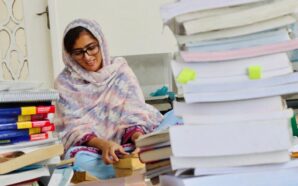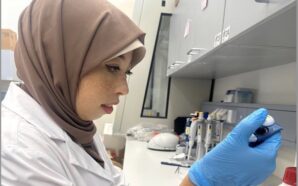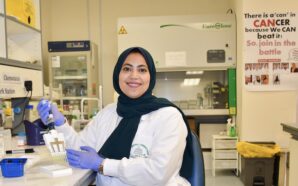Tell us about yourself and your professional journey?
I am a trained engineer. Growing up, sciences were my favourite subjects which I excelled in through primary and high school. I ended up pursuing a course in engineering for my undergraduate. While in my fourth year of study, my interests shifted, and I fell in love with computer science. I also wanted to help kids who didn’t get opportunities like I did growing up; a chance to interact with technology. This is how Kids Comp Camp was formed; a platform to reach out to kids across Africa. It is operational in Kenya and Rwanda.
What were some of the challenges in your career journey and how have you overcome them?
 I come from an average middle-class family, going to school wasn’t a smooth run. I attended public schools from primary all the way to universities. That meant I had to work hard in school because that’s the only way I was guaranteed of advancing to the next level in school. Public schools are not some of the most well equipped and even if they are, the resources are not enough for every child. I remember in high school, I couldn’t do computer studies because they had limited slots. But my greatest achievement so far is being able to evolve my career from an Engineer who wanted to be on the field to running a program that reaches to so many unfortunate kids in Kenya and that gives me satisfaction.
I come from an average middle-class family, going to school wasn’t a smooth run. I attended public schools from primary all the way to universities. That meant I had to work hard in school because that’s the only way I was guaranteed of advancing to the next level in school. Public schools are not some of the most well equipped and even if they are, the resources are not enough for every child. I remember in high school, I couldn’t do computer studies because they had limited slots. But my greatest achievement so far is being able to evolve my career from an Engineer who wanted to be on the field to running a program that reaches to so many unfortunate kids in Kenya and that gives me satisfaction.
Tell us about some of your professional milestones achieved?
I work in the voluntary sector now and one of my greatest milestones is to say with pride that I have interacted with more than 5000+ kids across Kenya and in Rwanda. And as for those kids, they either know what a computer is, have had the opportunity to operate one or have even written a line of code. Through the program, I’ve had opportunities to attend and participate in different conference such as the African Women in Tech and many more.
Tell us about Kids Comp Camp and what it aims to achieve?
Kids Comp Camp is an initiative that seeks to help young learners, in Africa’s undeserved regions, catch up with the digital age. We teach young learners basics of computers all the way to programming. And the reason we do this is because statistics show that STEM (Science, Technology, Engineering and Math has created 58 percent of new jobs yet in Africa less than two percent of the students under 18 years of age finish school with any notable STEM skills. http://kidscompcamp.com/
Tell us about the project #SheCanCode?
#SheCanCode is a Kids Comp Camp partnership with General Electric (Kenya) and Microsoft. The main objective is to promote STEM among young girls in Kenya particularly in the fields of Tech where we are teaching girls how to code and apply that to solve different problems they face.
A survey by Google found that the gender gap in computer science begins at age 12; boys’ interest goes up and girls’ goes down making this a key gap and opportunity window for #Shecancode to exposes and support girls to learn STEM. The program offers opportunities for more girls to start interacting with technology at their early ages and understand how technology works and how it improves their lives and communities.
Do you think access to the Internet is important for children and especially girls to empower them, how?
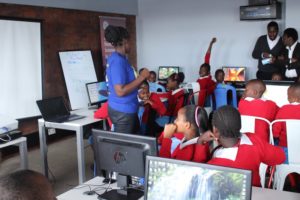 Access to tech and the Internet is one of the tools women and girls can use to empower themselves and help them address issues affecting them in health, education, economic and social sectors.
Access to tech and the Internet is one of the tools women and girls can use to empower themselves and help them address issues affecting them in health, education, economic and social sectors.
What are some of the issues preventing access to the web and technology?
Affordability is one! Though tech has been greatly embraced in Kenya with a current mobile penetration across the country at 89 percent while the Internet penetration is at 82.6 percent still majority of women and girls especially at the grassroots level have been largely been left behind.
Literacy levels are still low as indicated by Web Foundation study in 2015. 37 percent of women use internet compared to 59 percent of men.
Online harassment is another issue. Women are more likely to be harassed online than men and that makes them shy away from voicing their inputs online.
Providing access also means creating a safe environment, how can that be ensured?
Education is an important tool that enables online safety as it teaches women, girls and kids how to stay safe online. They need to be taught and be made aware of privacy, what to share and not to share especially on social media platforms where most predators are usually found.
It is equally important to having laws and policies that seek to regulate how people interact on the digital space.
Coming back to Kids Comp Camp, what are some of the challenges and milestones?
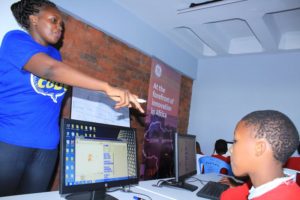 Kidscompcamp won the fire award in 2016. We have reached out to 7000+ young learners aged 8-20years in Kenya and Rwanda. For about 90 percent of these kids, this was their first time to interact with a computer and out of 7000+, 54% were girls. Our next milestone is reach 10,000 young learners: what we have dubbed vision 10K (#vision10k). Our greatest challenge is getting funding to run our operations given we do not charge the kids for the trainings since our target communities can’t afford to pay.
Kidscompcamp won the fire award in 2016. We have reached out to 7000+ young learners aged 8-20years in Kenya and Rwanda. For about 90 percent of these kids, this was their first time to interact with a computer and out of 7000+, 54% were girls. Our next milestone is reach 10,000 young learners: what we have dubbed vision 10K (#vision10k). Our greatest challenge is getting funding to run our operations given we do not charge the kids for the trainings since our target communities can’t afford to pay.
Anything you wish to add
There is an African proverb that says “It takes a whole village to raise a child” which basically means the child does not belong to the parent only, but the community is also welcomed to assist in parenting. At Kids Comp Camp, we acknowledge that fact and we are always open to different stakeholders who share in our vision to be that village for the different kids we seek to impact. You can support here.








